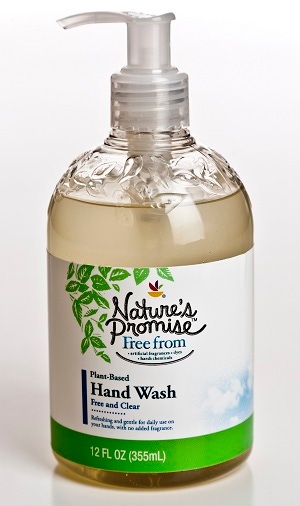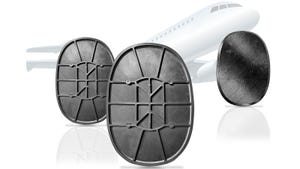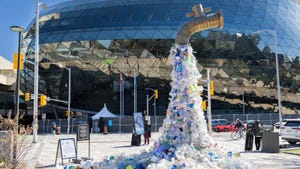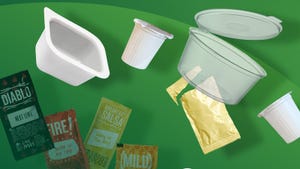First LiquiForm molded bottle launched by Amcor
PET bottle made with 50% PCR content for Nature's Promise hand soap is produced using the revolutionary LiquiForm molding process on proprietary form-fill machinery.

After several years in test and development, the game-changing LiquiForm technology has been proven by licensee Amcor (Ann Arbor, MI) with the commercialization of the first consumer package. The unique technology from the LiquiForm Group (Ann Arbor) that uses the product and not the air to form the bottle has the potential to improve packaging consistency and lower the carbon footprint associated with filling and packaging.
Amcor partnered with Greenblendz (Auburn Hills, MI), a co-packer and developer of private label, environmentally-friendly consumer products, to develop and commercialize packaging for the Nature’s Promise brand of hand soap.
Amcor produced the 12oz PET Boston Round bottle, which is made with 50% post-consumer content, on a proprietary Amcor-built machine that's the industry’s first manufacturing unit to successfully utilize the LiquiForm technology.
“We’re excited to be a partner in the commercial validation of such a highly sustainable manufacturing process,” said Steve Berry, Greenblendz founder and COO. “LiquiForm technology delivers enormous efficiencies throughout the supply chain and improves the industry’s carbon footprint.”
The 12oz/19-gram bottle is a drop-in replacement for the current Nature’s Promise container and uses the existing closure and label. It features a 24-mm finish and high-definition texturing characteristic of the LiquiForm process. A wraparound label and pump-dispenser closure complete the packaging.

Optimized benefits of on-demand production
LiquiForm technology uses the packaged product instead of compressed air to simultaneously form and fill containers. In this case, the hand soap essentially forms its own rigid PET container. By combining forming and filling into one step, the process eliminates costs associated with the equipment and energy of the traditional blow-molding process along with the handling, transport and warehousing of empty containers.
“LiquiForm has the potential to revolutionize the filling and packaging industries with a more flexible, efficient, and sustainable supply chain,” says Ann O’Hara, vice president and general manager of Amcor Rigid Plastics’ Diversified Products Division. “The development and launch of the first commercial manufacturing machine and the introduction of the first commercial product represents two major milestones for the LiquiForm technology.”
ADM Cleveland 2018 showcases the latest in robotics, automation, plastics, packaging and design engineering through 5 integrated events including Pack and PLASTEC. For more information, visit the website. |
LiquiForm insights, details and options
Ashish Saxena, vp and General Manager of the LiquiForm Group, spoke earlier this month at The Packaging Conference about the technology and referenced this first commercial application.
“Using a liquid rather than air to create the bottle results in much better definition and reduced crystallinity,” he said, pointing out that containers can be molded with Braille lettering, for example. “And it also provides better top load strength for ‘free,’” he added.
Saxena also believes that there’s an opportunity for improved productivity since most containers can be formed in a 0.8 second cycle and that stock preforms can be used “in most instances.”
The process uses regular grades of PET resin in cold, ambient and hot-fill operations from 10° C/50° F to 87° C/189° F. In addition to PET, polymer options include polypropylene and high-density polyethylene.
Container design possibilities include ovals, swirls, faceted, off-center neck, flasks and more. Container sizes currently range from 200mL to 2,000mL.
Potential products are water, tea, soap, laundry detergent, motor oil, shampoo and others.
While the company was concentrating initial efforts on dedicated LiquiForm machinery, Saxena also noted that retrofitting of molding equipment to the LiquiForm process is “perhaps possible."
He foresees the technology moving from home care markets this year into beverages in 2019.
Other licensees of the technology are KHS, Krones, Sidel and Yoshino.
The forming of bottles with Amcor’s LiquiForm process also opens new pathways toward lighter, more sustainable packaging. Lighter weight containers, achieved through improved consistency in wall thickness, combined with a reduction in the transport of empty containers, reduces environmental emissions and lowers the carbon footprint. It also has the potential to reconfigure supply chains and move packaging closer to the market to greatly improve logistical benefits.
About the Author(s)
You May Also Like




